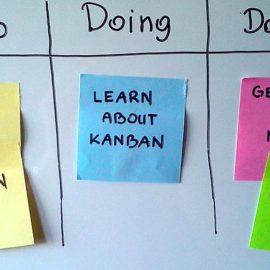
This is a free excerpt from one of Shortform’s Articles. We give you all the important information you need to know about current events and more.
Don't miss out on the whole story. Sign up for a free trial here .
Is remote work going away? Will it continue into 2023 or will remote jobs decline?
Employers argue that remote work is less efficient and less productive—especially in jobs that require collaboration and creativity. However, employees’ priorities have changed—many might not be willing to come back to work even if it means taking a pay cut or losing a job.
Keep reading for further insight into the future of remote work and if it’s going away or here to stay.
Is Remote Work Going Away?
In November, Elon Musk announced that he was ending remote work at Twitter. This announcement comes just a few months after Musk ordered all Tesla employees back to the office, quipping that those still interested in remote employment should “pretend to work somewhere else.” Musk isn’t alone in his opposition to remote work—in September, numerous employers began pushing employees to return to the office in either fully in-person or hybrid capacities. This trend raises the question: Is remote work going away?
Yes: It’s Bad For Business
Some experts see these recent trends as a sign that remote work is no longer economically viable. Indeed, although some workers favor returning to the office—for example, because they miss the socialization—most of the arguments against remote work come from employers, who claim that working from home hurts the bottom line.
Working From Home May Be Less Productive
For one thing, some experts argue that working from home is inefficient because remote work eliminates opportunities for coordination, cooperation, and on-the-job learning. Similarly, though a majority of research suggests that working from home boosts productivity, some studies show that remote work decreases overall output and uninterrupted work time.
The question of efficiency is especially complicated when it comes to jobs that rely on teamwork. For example, former Google executive David Baker argues that in-person interaction is necessary for innovation because it allows spontaneity while decreasing interpersonal tensions. And while research shows that it’s possible to recreate this collaborative atmosphere remotely, in practice, employees and managers alike are usually ill-trained and ill-equipped to do so.
Remote Workers Are Harder to Manage
For those in favor of remote work going away, another argument is that working from home makes managers’ lives harder. For one thing, many managers believe that employees are more motivated and less distracted when they’re being monitored in person. Moreover, working from home presents a number of new challenges for managers. For example:
- It’s harder to schedule and coordinate work across your team when everyone works different hours.
- Working from home deprives managers of emotional cues that, in an in-person setting, might prompt an effective intervention (for example, if a manager notices an employee’s frustration and steps in to help).
- Managers have fewer opportunities to offer praise and motivation to remote workers on a daily basis.
No: Remote Workers Aren’t Willing to Come Back
On the other hand, many experts believe that the widespread adoption of working from home during Covid may have permanently changed the way many people think about their jobs, meaning remote work won’t go away anytime soon.
Workers’ Priorities Have Changed
Despite the pushback from employers, data suggests that workers may not be willing to let go of the benefits they enjoy, which include:
- A greater sense of productivity (whether or not they’re actually more productive, remote employees work longer hours while reporting that they feel less stressed and more productive)
- Increased freedom and flexibility
- A lack of a commute
- A better work-life balance
Working From Home Dramatically Reduces Costs
Most dramatically, remote work offers businesses substantial cost reductions. One study found that companies can save as much as $11,000 per employee working from home for just two or three days per week. The savings come primarily from reductions in rent, cleaning fees, food costs, and taxes.
Remote Workers Broaden the Talent Pool
Finally, in a trend that helps businesses and workers alike, remote work has opened up new avenues of employment for people who traditionally may have had a hard time finding employment. For example, remote work increases employment opportunities for people dealing with extra challenges such as physical limitations, substance abuse issues, or caregiving responsibilities.
What Does the Future Hold?
If remote work is not going away, the future won’t be all Zoom meetings—rather, experts estimate that roughly 20% to 30% of workers will be fully remote and the rest will likely have hybrid schedules. New companies will form with remote and hybrid work optimization in their DNA.
For workers, there will be pros and cons. On the upside, working from home gives employees the freedom to live where they want—and where they can comfortably afford, as prices soar for everything from homes to groceries. If the economic recession brings layoffs, remote workers may be more flexible about reducing their hours to meet the company’s needs, which could keep them off the chopping block.
On the other hand, one poll found that 60% of managers say remote workers will likely be the first to be laid off in the looming recession. And when their jobs aren’t at risk, employees working from home may still have to speak up more to ensure their managers don’t forget about them when it comes to pay raises and promotions. Early-career employees might also find that it takes longer to climb the corporate ladder, as working from home offers fewer opportunities to meet and learn from mentors.
But just as we’ve seen seismic changes in workplace culture and norms to support remote work in just the last two years, more are sure to come.

Want to fast-track your learning? With Shortform, you’ll gain insights you won't find anywhere else .
Here's what you’ll get when you sign up for Shortform :
- Complicated ideas explained in simple and concise ways
- Smart analysis that connects what you’re reading to other key concepts
- Writing with zero fluff because we know how important your time is






